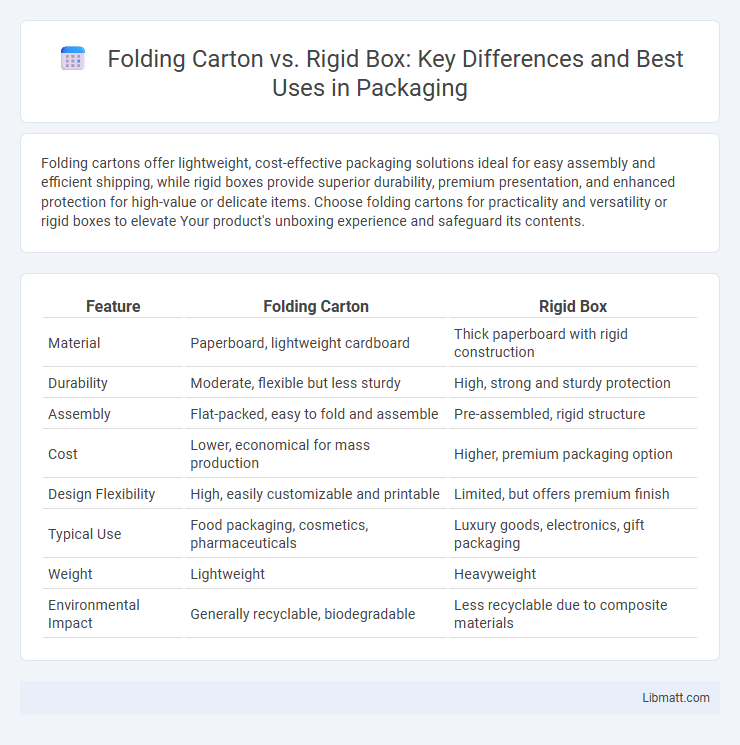Folding cartons offer lightweight, cost-effective packaging solutions ideal for easy assembly and efficient shipping, while rigid boxes provide superior durability, premium presentation, and enhanced protection for high-value or delicate items. Choose folding cartons for practicality and versatility or rigid boxes to elevate Your product's unboxing experience and safeguard its contents.
Table of Comparison
| Feature | Folding Carton | Rigid Box |
|---|---|---|
| Material | Paperboard, lightweight cardboard | Thick paperboard with rigid construction |
| Durability | Moderate, flexible but less sturdy | High, strong and sturdy protection |
| Assembly | Flat-packed, easy to fold and assemble | Pre-assembled, rigid structure |
| Cost | Lower, economical for mass production | Higher, premium packaging option |
| Design Flexibility | High, easily customizable and printable | Limited, but offers premium finish |
| Typical Use | Food packaging, cosmetics, pharmaceuticals | Luxury goods, electronics, gift packaging |
| Weight | Lightweight | Heavyweight |
| Environmental Impact | Generally recyclable, biodegradable | Less recyclable due to composite materials |
Introduction to Folding Cartons and Rigid Boxes
Folding cartons are lightweight, cost-effective packaging solutions made from paperboard that can be easily folded into various shapes and sizes for consumer products. Rigid boxes, constructed from thick cardboard or chipboard, offer superior durability and premium presentation commonly used for luxury items like electronics and cosmetics. Both packaging types serve distinct purposes, with folding cartons favored for mass production and rigid boxes chosen for high-end branding and protection.
Key Differences Between Folding Cartons and Rigid Boxes
Folding cartons are made from paperboard and are designed to be folded flat for efficient shipping and storage, while rigid boxes use thicker, more durable materials like chipboard covered with decorative paper or fabric, providing enhanced strength and a premium feel. Folding cartons offer cost-effective, lightweight packaging solutions ideal for mass-produced consumer goods, whereas rigid boxes are favored for luxury products due to their durability and higher perceived value. Your choice between these packaging options depends on the balance of budget, product protection, and brand presentation requirements.
Material Composition and Structural Design
Folding cartons are typically made from lightweight paperboard materials such as bleached or unbleached kraft paper, designed to be folded and glued for compact, flat-pack shipping. Rigid boxes use thicker, multi-ply cardboard or chipboard combined with high-quality paper coverings or laminates, providing a sturdy, non-collapsible structure with sharp edges. The structural design of folding cartons prioritizes flexibility and efficient assembly, while rigid boxes emphasize durability and premium presentation through reinforced corners and rigid construction.
Cost Comparison: Folding Carton vs Rigid Box
Folding cartons generally offer a more cost-effective packaging solution compared to rigid boxes due to lower material and production expenses, making them ideal for high-volume product packaging. Rigid boxes demand higher investment in raw materials like chipboard and require more labor-intensive manufacturing processes, resulting in significantly higher costs per unit. This cost difference often influences packaging choices in industries where budget constraints are critical, despite rigid boxes providing superior durability and premium presentation.
Customization and Branding Opportunities
Folding cartons offer versatile customization options such as full-color printing, embossing, and various finishes that enhance brand visibility and consumer appeal. Rigid boxes provide a premium, sturdy feel with opportunities for luxurious elements like magnetic closures, foil stamping, and unique textures that elevate brand perception. Your choice between these packaging types depends on the desired balance of cost-effective customization and high-end branding impact.
Durability and Product Protection
Rigid boxes offer superior durability and enhanced product protection due to their sturdy construction with thicker materials, making them ideal for high-value or fragile items. Folding cartons, while more cost-effective and lightweight, provide moderate protection suited for less fragile products but may lack resistance against crushing and moisture. Choosing the appropriate packaging ensures your product remains intact and presents well during shipping and handling.
Environmental Impact and Sustainability
Folding cartons typically have a lower environmental impact due to their lighter weight and efficient use of materials, making them easier to recycle and transport with reduced carbon emissions. Rigid boxes, while more durable and perceived as premium, often involve heavier materials like thick cardboard or composite layers, resulting in higher resource consumption and more challenging recycling processes. Your choice between these options can significantly influence your brand's sustainability footprint, with folding cartons generally offering a more eco-friendly packaging solution.
Applications and Industry Usage
Folding cartons dominate packaging in food, cosmetics, and pharmaceuticals due to their cost-effectiveness and versatility in printing and customization. Rigid boxes, often used in luxury goods like jewelry, electronics, and high-end confectionery, provide superior durability and a premium unboxing experience. Industries prioritize folding cartons for mass production efficiency while selecting rigid boxes for brand differentiation and product protection.
Consumer Perception and Unboxing Experience
Rigid boxes convey a premium, luxurious feel that enhances consumer perception through their sturdy construction and elegant design, often associated with high-quality products. Folding cartons offer practicality and cost-efficiency but may lack the tactile satisfaction and durability that contribute to an impressive unboxing experience. Consumers tend to perceive rigid boxes as more prestigious and durable, which can positively influence brand value and customer loyalty.
Choosing the Right Packaging for Your Product
Selecting between a folding carton and a rigid box depends on your product's protection needs, budget, and shelf appeal. Folding cartons offer lightweight, cost-effective packaging suited for lighter items, while rigid boxes provide superior durability and a premium unboxing experience ideal for luxury goods. Understanding your product's fragility and brand positioning helps ensure the right packaging choice enhances customer satisfaction and brand perception.
Folding carton vs rigid box Infographic

 libmatt.com
libmatt.com